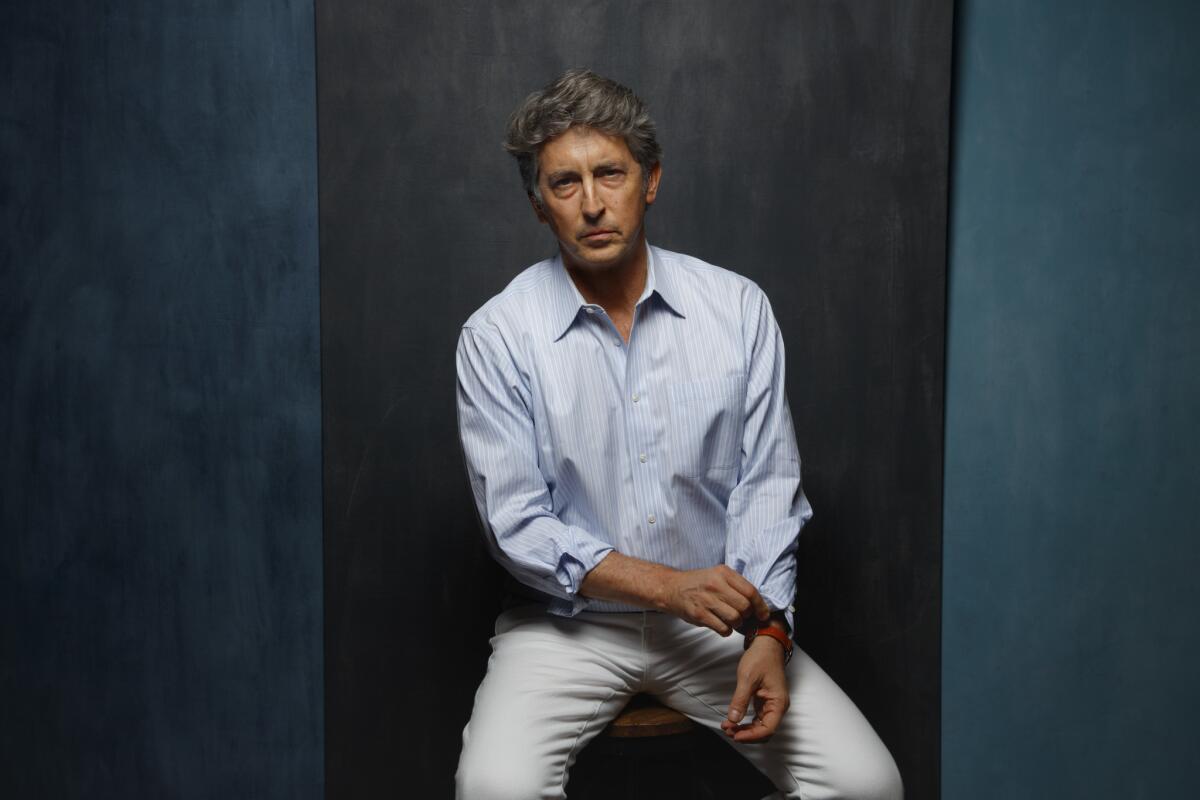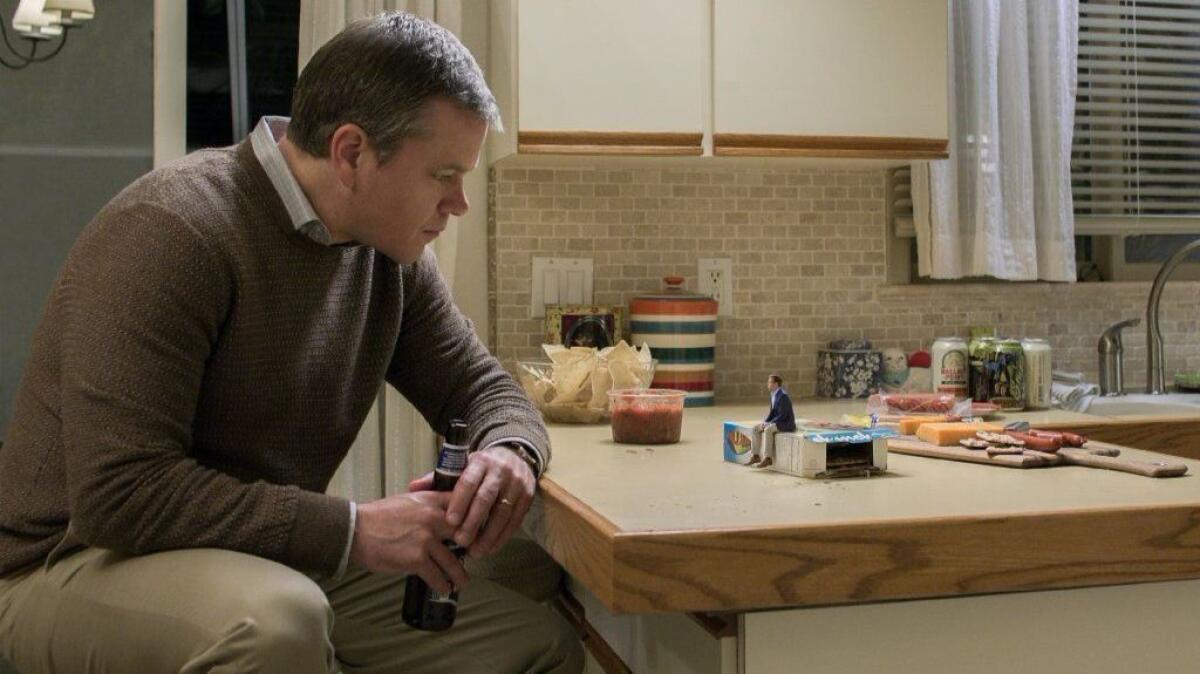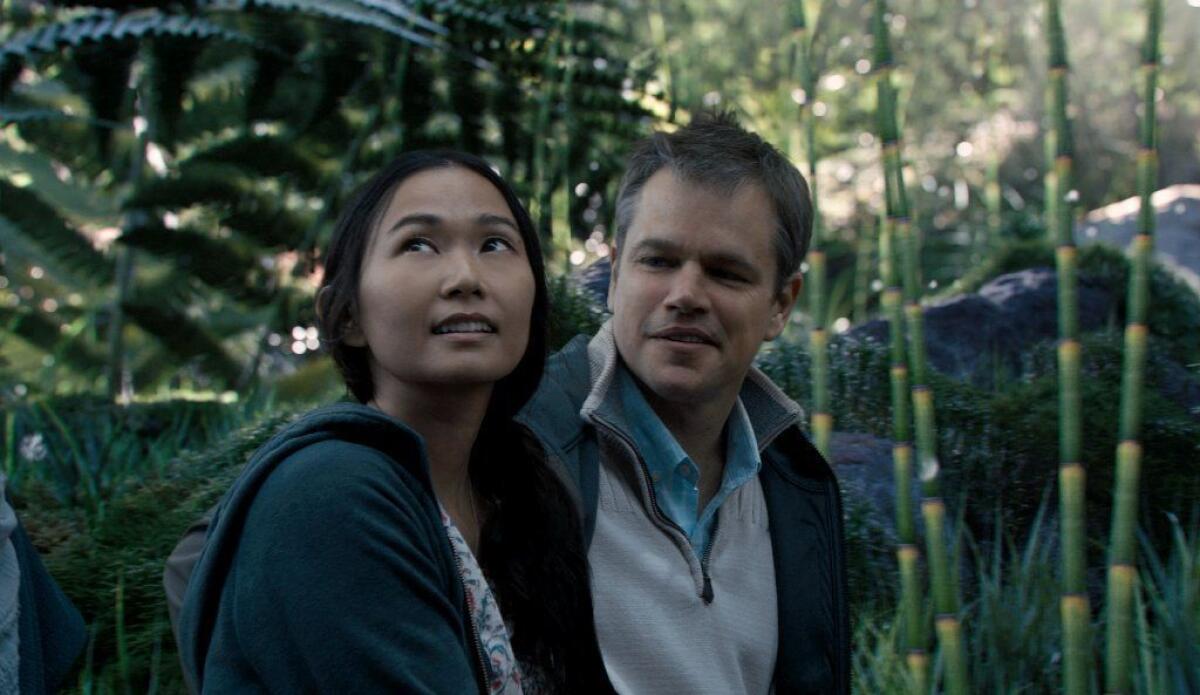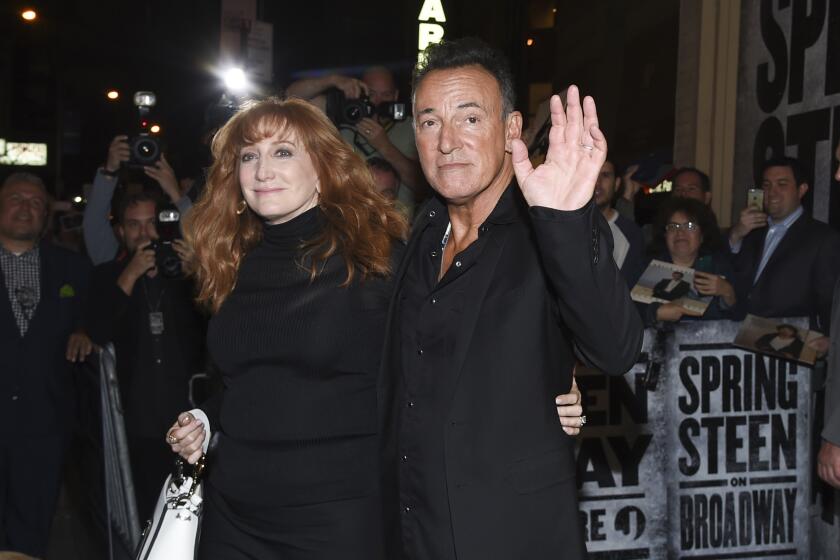Q&A: Alexander Payne’s sci-fi satire ‘Downsizing’ grapples with big ideas and (extra) tiny characters

With his new film “Downsizing,” in theaters Friday, Alexander Payne — the director of such critically acclaimed, sharp-edged comedies as “Election,” “About Schmidt,” “Sideways” and “The Descendants” — is going big by going small.
Set in a near-future in which scientists hoping to avert a global environmental catastrophe have figured out how to shrink people down to five inches in size, the film centers on a mild-mannered Midwestern Everyman named Paul Safranek (Matt Damon). After undergoing the miniaturization procedure, Safranek meets a similarly Liliputian but fiery-spirited disabled Vietnamese dissident named Ngoc Lan Tran (Golden Globe and SAG Award nominee Hong Chau) and sets off on a profoundly life-changing adventure.
You know, one of those movies.
With a reported $68-million budget, the sci-fi social satire represents an audacious gamble both for Payne and Paramount Pictures, which is releasing it. “[The film’s success] depends on whether enough people want to see something that’s just a little challenging, that’s still fun but gives them something to think about,” said Payne’s longtime collaborator, Jim Taylor, who co-wrote the screenplay with him. “It’s sort of like whether you’re having a Big Mac or something that might introduce some different tastes to your palate.”
On a recent morning, Payne, 56, sat on the deck of the Topanga Canyon home he shares with his wife and their three-month-old daughter, seeming remarkably relaxed as he sipped a cup of herbal tea. Asked how he was feeling with the release of the biggest movie of his career just days away, the filmmaker — whose wry sense of humor is as evident in person as in his work — shrugged.
“Curious,” he said. “It’s out of my hands. We went to Sears and bought it its little back-to-school outfits and got it a fresh haircut, and it’s now off to school.”

This movie has been a long time coming. You first tried to get it made almost a decade ago, right?
Look, I’m not going to complain. War, poverty and injustice are difficult. This is — we should hope for such problems. But it was time-consuming to get financing. One studio chief said to me, “It’s too intelligent for the money you’re asking for.” I don’t fault them. It’s the business they’re in. And with this economic model and in these times, they know they have to dumb down smart things in order to put more butts in seats.
It came down to one — count them, one — studio chief [late former Paramount head Brad Grey] who said, “I know it doesn’t make sense on paper but we’re going to make it anyway.” Which is how good movies get made and always have: from the gut instinct of the financiers, not just by committee and research.
My whole career has been like this. I’m considered to some degree a successful director working in Hollywood, making films my way but using studio financing. But with almost every single one, I get praised up the wazoo by people who never would have financed the films. It’s: “Gee, this movie is so new and different — what do you want to do next?” “This.” “Oh, that’s too new and different.”
The premise of a future in which people can be shrunk down to five inches tall seems simple but the plot goes off in totally unpredictable directions. What was the key to cracking the screenplay?
The vehicle: What’s the story and who’s the protagonist? It could be anything. It could be a family of poor Hmongs. It could be a corporate CEO. But we chose that archetype that we’ve used before: the schnook from Omaha.
We’ve always approached screenplays and so forth with, “How would it really happen?” Not “What’s the movie version?” but “What’s the real-life version?” Then we just follow our noses.
Between the sci-fi premise and the bigger budget, “Downsizing” is being characterized as a departure from your previous movies. Do you see it that way?
I don’t think so. There’s just more of it. It does what science-fiction premises do — it gives you a “what-if” prism to look at the contemporary world with a wack on the side of the head. But it’s a comedy.

People have had very different reactions to Hong Chau’s character. Some see her as the soul of the movie but other people feel like the film scores laughs at her broken English in a way that makes them uncomfortable. Were you surprised by those reactions?
I was completely surprised and puzzled. None of that ever occurred to any of us while conceiving, casting, shooting and editing the film. She was a character conceived and executed with tenderness.
I’ve never seen a one-legged, monomaniacal, Christian, Vietnamese activist-dissident who’s five inches tall. I don’t know what’s stereotypical about that.
More than with any of your previous movies, the reviews for “Downsizing” have been all over the map. Do you read reviews?
I read reviews of critics I respect and feel I can learn something from. Right now there are a lot of bottom-feeder critics who just have access to a computer and don’t necessarily have an academic or cinema background that I can detect, so I tend to ignore that and stay with the same top-tier critics that I’ve come to respect. I like reading a good review — it doesn’t have to be favorable, but a well-thought-out one — because I very much appreciate the relationship of directors and critics.
I remember Joe Morgenstern of the Wall Street Journal panned [Payne’s 1996 directorial debut] “Citizen Ruth.” I met him four or five years later and I shook his hand and said, “I’m Alexander Payne. I made ‘Citizen Ruth.’ I want you to know, I agree with your review.”
Just because I make them doesn’t mean I think they’re great. I just make them and then when I’m done with them I’m just a filmgoer like I always am. They’re all lessons. I’m still in film school, honestly. And this one is just a dry run for whatever the next one is.
Are we too inured by that torrent of images and the ridiculousness of modern political life, so that nothing shocks us anymore?
— Alexander Payne
You said in an interview recently that you’re not sure if “Downsizing” is “fierce enough for 2017.” Do you feel like it’s getting harder to do satire given how increasingly insane real life is becoming?
I don’t know. I don’t do it every day — I’m not doing “The Daily Show” or “Colbert.” It’s a larger question for me: Does cinema have the power to jolt or to shock?
Were “A Clockwork Orange” or “Blue Velvet” released today, would they have the same power to shock that they had when they came out? Are we too inured by that torrent of images and the ridiculousness of modern political life, so that nothing shocks us anymore? What does it take to shock someone today — or at least jolt them? I don’t have an answer. I’m just asking the question.
There’s been a trend in recent years of directors making the leap from small indie films to giant studio tentpoles. Have you gotten those kinds of offers?
I don’t get those calls. I think I’m past my shelf-life on the young, white, male hotshot who gets the sudden golden ticket. And it can bite them in the ass. The poor chap they tapped to do “Fantastic Four” — everybody got burned. But now you’ve got Rian Johnson, who’s got a tremendous success [with “Star Wars: The Last Jedi”].
I’d love to be a director-for-hire and get a nice paycheck and captain one of those big ships, but I think [studios] mistakenly think I want to write what I direct — which I don’t. I write out of desperation, because I never get a script I like, other than “Nebraska.”
It’s a matter of: What’s the screenplay? Is it intelligent? Is it human? I don’t care what genre, what scale. I’m here for the movies.
You’re about to release a movie that envisions the end of the world and at the same time you just had a baby. How do you square those things in your head?
[laughs] What am I supposed to do: not have kids when all these other ... are having kids? It’s just one.
[dryly] Anyway, we’re in the sweet spot of global warming. The weather is quite delightful right now. Forty or 50 years from now is going to be a different story, but I say right now we just enjoy it — and maybe with the movie get a few laughs out of the deal.
Twitter: @joshrottenberg
ALSO
Hong Chau is poised to break big in 'Downsizing,' her second film
Review: Matt Damon gets small in Alexander Payne's fascinatingly muddled sci-fi satire 'Downsizing'
This is how Hong Chau responds to people who find her 'Downsizing' character controversial
Only good movies
Get the Indie Focus newsletter, Mark Olsen's weekly guide to the world of cinema.
You may occasionally receive promotional content from the Los Angeles Times.








